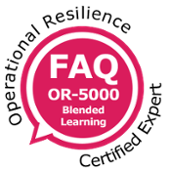What is "Improve Lesson Learnt"?
The key to improving "Lesson Learnt" is for an organisation to promote a culture of continuous learning and to improve from scenario testing and actual incidents.
It is essential to improve and communicate remediation and vulnerabilities after scenario testing.
What Should an Organisation Be "Learning"?
Lessons learnt in Operational Resilience by an organisation before and after an operational disruption should include the following:
- Be able to anticipate disruptive events.
- Be constantly learning from adverse events affecting the organisation or the industry.
- Be able to form part of an organisation's incident and crisis management processes.
- Be able to provide feedback and define better controls or mitigation measures for its key processes and resources.
- Be conducted as part of a series of scenario testing exercises in preparation for the actual operational disruption.


After implementing the OR program, an organisation can still experience a disruption or outage in a critical business service.
This can be due to an unpredictable "black swan" event, such as the COVID-19 pandemic, CrordStrike outage, unidentified interdependencies, or "black spots" within the organisation.
These may be some good documents to refer to in your organisation:
- Post-incident report
- Lesson learned report
Continuous Learning
In addition to the learning described above, the business landscape will continue to shift, requiring reassessment of threats and challenges, as well as impact tolerances, each year.
Hence, there is a need to continually learn and improve operational resilience. This includes defining the current and desired positions, and identifying steps to close the gap between them.
How to Improve and Communicate Lessons Learned?
Improving and communicating lessons learned is crucial for continuously enhancing operational resilience and fostering a culture of learning.
The following steps should be taken:
Analyse and Consolidate Lessons Learned
- Identify valuable insights from scenario testing, real-world disruptions, and post-incident reviews.
- Analyse common themes and trends across learning sources.
- Categorise lessons learned based on impact, urgency, and feasibility of implementation.
Develop and Implement Action Plans
- Prioritise high-impact lessons and translate them into actionable improvement plans.
- Assign ownership and responsibilities for implementing each action plan.
- Set clear timelines and milestones for achieving improvement goals.
Cultivate a Culture of Continuous Improvements
- Champion the value of learning from failures and near misses.
- Encourage open communication and reporting of potential risks and vulnerabilities.
- Foster a collaborative environment where everyone feels empowered to contribute to improvement efforts.
Communicate Lessons Learned Effectively
- Tailor communication strategies to different stakeholder groups (management, employees, regulators, etc.).
- Utilise diverse communication channels (reports, meetings, training sessions, etc.) to disseminate lessons and best practices.
- Craft a compelling narrative that highlights the value and impact of operational resilience improvement initiatives.
Monitor and Evaluate Improvement Efforts
- Track progress towards achieving action plan goals.
- Measure the effectiveness of implemented improvements through ongoing testing and monitoring.
- Adapt and refine action plans based on the collected data and learnings.
Overall, by the completion of Stage 5, "Improve Lesson Learnt" of the “Implement” phase of the Operational Resilience Planning Methodology, the professional will have demonstrated the skills and knowledge to:
- Leverage valuable insights from experience to enhance operational resilience.
- Drive continuous improvement efforts within their organisations.
- Foster a culture of learning and open communication.
- Effectively communicate the value and impact of operational resilience to stakeholders.
By completing this phase, OR professionals will help build a more resilient and adaptable organisation prepared to withstand and recover from disruptions.
"Implement" Phase of the OR Planning Methodology
| Identify Important Business Services | Map Processes and Resources |
Set Impact Tolerance |
Conduct Scenario Testing | Improve Lesson Learnt | |
 |
 |
 |
 |
 |
More Information About Operational Resilience OR-5000 [BL-OR-5] or OR-300 [BL-OR-3] Course
To learn more about the course and schedule, click the buttons below for the OR-3 Blended Learning OR-300 Operational Resilience Implementer course and the OR-5 Blended Learning OR-5000 Operational Resilience Expert Implementer course.
 |
 |
 |
 |
 |
![[BL-OR] [3-4-5] View Schedule](https://blog.bcm-institute.org/hs-fs/hubfs/hub_generated/resized/e4287b59-1a43-4e10-8e43-c73b27b3ca39.png?width=172&height=50&name=e4287b59-1a43-4e10-8e43-c73b27b3ca39.png) |
![[BL-OR] [3] FAQ OR-300](https://blog.bcm-institute.org/hs-fs/hubfs/hub_generated/resized/294e989f-8613-4bf3-96a5-a89408cfb9ca.png?width=150&height=150&name=294e989f-8613-4bf3-96a5-a89408cfb9ca.png) |
 |
|
 |
 |

![BB OR [B] 2 BB OR [B] 2](https://blog.bcm-institute.org/hs-fs/hubfs/BB%20OR%20%5BAi%20Gen%20Blog%20Photo%5D/OR%20Pictures%20A/BB%20OR%20Folder%20B/BB%20OR%20%5BB%5D%202.jpg?width=2000&height=1333&name=BB%20OR%20%5BB%5D%202.jpg)



![[Banner] [Summing] [OR] [E2] [C13] Improving Lessons Learned](https://no-cache.hubspot.com/cta/default/3893111/71190ffb-94e6-4ae9-b40a-8f29585ab4ec.png)








![Email to Sales Team [BCM Institute]](https://blog.bcm-institute.org/hs-fs/hubfs/hub_generated/resized/850988ce-aa7d-4953-95cf-797635341edd.png?width=100&height=100&name=850988ce-aa7d-4953-95cf-797635341edd.png)


